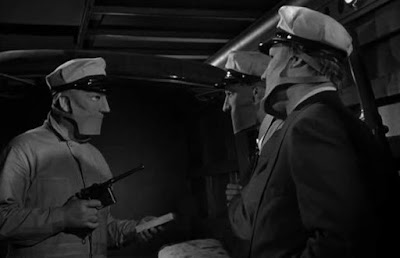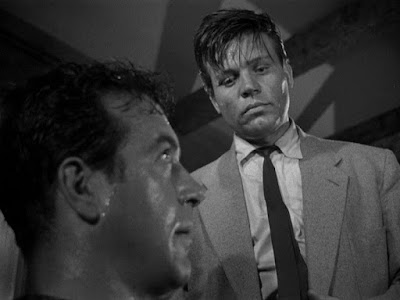Kansas City Confidential (Phil Karlson, 1952) One of director Phil Karlson's 1950's movies, the crime expose The Phenix City Story (released in 1956) was just put into the National Film Registry. You know the one where they vote in 25 films every year for films that are "culturally, historically, or aesthetically significant." Karlson was another of those "maverick" directors, he could work in any genre, but spent a long time as an assistant director and quit that job so he could direct at bargain basement studios, where he could make movies the way he wanted to with little interference as long as he could keep the finances down.
One gets the impression from watching his movies, that he'd just as soon throw a movie camera into the audience's face as do something fancy to get your attention. He made movies that were cynical, had no interest in authority, and where one could feel the grit right underneath the emulsion. It's why Desi Arnaz hired him to direct the pilot of the TV-show "The Untouchables," he wanted a low budget 20's-30's noir-equivalent. His most famous movies are the sequel to Willard called Ben, and the movie where he made his fortune, the original version of Walking Tall with Joe Don Baker.
But, Quentin Tarantino's seen his movies. Watch Kansas City Confidential (and you can below—it's public domain on the Interwebs, although M-G-M retains the broadcast/movie rights to it) and you see where his Reservoir Dogs came from.
Only Kansas City Confidential isn't so cute with the dialog or the cultural references.
It begins with a hand-drawn map, a clock on the wall and a notebook filled with the names of low-life's. "Mr. Big" (we'll call him, as played by Preston Foster) notes the activities of the bank across the way at opening time. He notes the activity—a regular one by Western Wholesale Florists to the flower shop next door, the arrival of the early-birds to do bank-business, and the arrival of an armored car a few minutes later. He carefully checks off the routine. Then, he makes phone-calls to numbers in that notebook.
The instructions to the three men on the other side of the phone-calls are the same. There's a job. Meet him at Room 302. Baker Street Hotel. There will be a big pay-off. First on the list is Pete Harris (Jack Elam), the proverbial nervous little man in a shabby room. He chain-smokes, has gambling debts—craps is his vice. He will be the King of Spades. When Harris comes to the door, he comes armed, but the man in Room 302 makes quick work of dis-arming him and slapping Harris to attention. Harris is shocked by the man in Room 302; he is masked, gives no name, no details, but promises a pay-out of $300,000 to start a new life in another country.
Next on the list is Tony Romano (Lee Van Cleef), a sharpie with creases in his suit as sharp as his cheek-bones. He likes the dames and he likes poker, but he isn't so lucky. He's smarter than Harris and a bit too sure of himself, but 300k, he'll play along. He'll be the King of Clubs. Finally, there's the cop-killer Boyd Kane (Neville Brand) who chews bubble-gum nice and slow, doesn't talk much but sweats a lot, and he's such a high-risk that he takes the job.
It's a typical day at the bank. Western Wholesale Florists shows up to make the delivery. Driver Joe Rolfe (John Payne—sorta Robert Mitchum without the sleepy eyes) has the misfortune of nearly running over a bank customer who says "Why doncha watch where yer goin'?" He's going to not make that mistake again the whole movie. He makes the delivery and takes off, none the wiser, as the armored car parallels up. Then, while the guards are in the bank, another truck with the same Western Wholesale logo slides up behind it. When the guards with the money-bag come out, the Florist truck pulls up alongside, two men in masks jump out the back, cudgel the guards and throw the bag to a third man waiting in the back. They pile in and squeal off, leaving the too-late, too-old bank-guard to fire at their long-gone retreat.
The delivery van speeds to a waiting moving van, and it ramps into the hold. The crooks, still in their masks, want their pay-out, but Mr. Big tells them to shut up and keep their masks on—they're too "hot" and the money is, too. Nobody knows anybody's name, making them all "cop-proof and stool-pigeon proof." "Big" hands each man a stipend for them to travel to Tijuana and await instructions and half-a-playing card to serve as I.D. at their rendezvous in the future. Then, one by one, they jump out of the moving van—it's up to them to make it to Tijuana, to wait for a cable-gram for what's next.
Good day for them. Bad day for Rolfe, who gets pulled over in his delivery van during his work-day and gets man-handled by the police, and his afternoon-deliveries get ransacked looking for the stolen dough. Hauled in for questioning, he gets roughed up and accused—what was he doing in that van? His job that he got from his parole officer after a stretch on gambling charges. Rolfe is a good suspect. Never finished college to be an industrial engineer, did a stretch in the service earning a Purple Heart and a Bronze Star ("Try buyin' a cup o' coffee with 'em," he snarls), and is trying to earn money to go back to school. Well, tough luck, kid. He just lost his job—he should understand says his boss—Western's clients are "very conservative people, you know how it is."
The bank's reward, put up by its insurance company is a quarter of the $1.2 million stolen from the bank. 30k. Rolfe would love to have that, but he doesn't know a thing, even though he gets beaten up by a couple of very aggressive cops every day of his three-day holding stretch, thinking he might. Finally, they can't hold him any more—the duplicate delivery van has been found—and he gets released to find his mug plastered all over the front-page. No sense looking for work with that resumé. So, he goes on a one-man reconnaissance mission to find "the guys who framed me." With the help of a buddy he served with on Okinawa, he gets a line on Pete Harris—you can find him in Tijuana.
There the details stop for you. But, you get the gist—innocent man, desperate and hard-boiled, and with just enough brains to make him dangerous, especially to thieves with no honor and no idea who their "friends" are. But, once they all settle for that meeting in a Mexican resort town, they all—how did Raymond Chandler metaphor it?—"stand out like a tarantula on an angel-food cake."
Karlson was not a subtle director (remember what I said about throwing the camera?). There's a lot of casual violence, where people slap each other around with little provocation other than things are moving a little too slow—good thing the film's black and white, there'd be a lot of bruising make-up to apply—and even though the location's supposed to be Mexico, there's a lot of sweat going around. When the film's "good girl" (Colleen Gray) interrupts Rolfe getting a good beating, everybody starts to act "un-chalant" and saying they're just talking, to which she replies "...must have been a warm discussion." Nice.The bank's reward, put up by its insurance company is a quarter of the $1.2 million stolen from the bank. 30k. Rolfe would love to have that, but he doesn't know a thing, even though he gets beaten up by a couple of very aggressive cops every day of his three-day holding stretch, thinking he might. Finally, they can't hold him any more—the duplicate delivery van has been found—and he gets released to find his mug plastered all over the front-page. No sense looking for work with that resumé. So, he goes on a one-man reconnaissance mission to find "the guys who framed me." With the help of a buddy he served with on Okinawa, he gets a line on Pete Harris—you can find him in Tijuana.
There the details stop for you. But, you get the gist—innocent man, desperate and hard-boiled, and with just enough brains to make him dangerous, especially to thieves with no honor and no idea who their "friends" are. But, once they all settle for that meeting in a Mexican resort town, they all—how did Raymond Chandler metaphor it?—"stand out like a tarantula on an angel-food cake."
It's also tough to keep track of the fire-arms in Kansas City Confidential. Everybody's got a gat and they flash them a lot...or get caught reaching into their jacket-pockets. What was Bogart's line? My, my, so many guns, so few brains."
Except the one behind the camera. There are a couple fluff's here and there, not every "i" is dotted, not every double crossed, but Karlson makes sure Kansas City Confidential has the bad good's and it's a solid film noir where the world is so much against you that swapping it for the business-end of a gun actually feels pretty good. It may be "Take Out the Trash" day here, but every so often you find a nugget buried.
Got 90 minutes to kill? This one will keep it a misdemeanor.


































